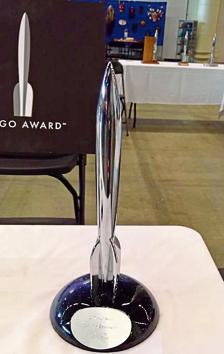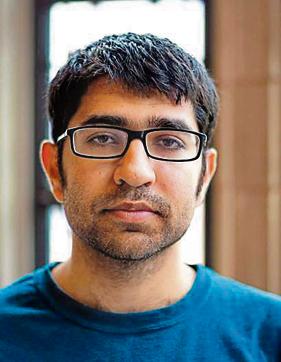2 Indians nominated for Hugo Awards for science fiction and fantasy
Dalit writer Mimi Mondal and lawyer Gautam Bhatia are on the shortlist for the Oscars of the sci-fi world.
Kolkata-born Mimi Mondal has become the first Indian writer nominated for a Hugo award for a book she co-edited. Also on the nominee list is Delhi-based lawyer Gautam Bhatia, along with seven other editors and staff of the Strange Horizons magazine.

The Hugo Awards recognise, annually, the best published science fiction and fantasy (SFF) work worldwide.
“The Hugos, as well as the entire international SFF community, have historically been a nurturing space only for white people. It is still massively dominated by white men and Americans,” says Mondal, 30, who is now based in New York.
This is a layered victory for Mondal, who is also a Dalit. “To identify as Dalit is important to me,” she adds. “Contrary to popular opinion back home, casteism exists very strongly in the US and other Western countries. Often more strongly than in at least the urban spaces of India, since immigrant Indian communities are usually small and well-connected. I must acknowledge the struggles of my ancestors and my own, and represent the rest of the community that is so deeply oppressed.”
Mondal has been nominated for her first book, Luminescent Threads: Connections to Octavia E Butler, along with co-editor Alexandra Pierce, in the Best Related Work category. The book is a nonfiction anthology of several SFF authors’ and fans’ posthumous personal letters to Octavia Butler, one of the first African-American sci-fi writers, who died in 2006.

The aim of the book, Mondal says, was to document the tremendous challenges diverse authors face when it comes to gaining visibility and respect in the world of SFF. “These people are telling Butler about their struggles and triumphs in the genre, ranging from well-known authors to those for whom this book was their first publication.”
For 29-year-old Bhatia, meanwhile, the excitement comes from being nominated in a genre he has adored since he was 10. “I read my first sci-fi book, Hobbit, when I was 10 years old, and then Isaac Asimov’s The Foundation series. To be nominated does demonstrate certain recognition by peers,” he says.
Bhatia, a lawyer, joined the Strange Horizons editorial board in 2016, but has been contributing book reviews to the magazine for four years.
“Only if we have institutional structure for the SFF community can it flourish in India,” he says. “We need to have regular conventions where SFF authors and readers can come together to create readership and a sense of community.”
He does see signs of change in this respect already. “Take Mithila Review. It’s an online magazine based out of Delhi which features SFF writers from South Asia and around the world. They’re commissioning poetry, stories and reviews,” he says.
PAST FORWARD
There was an Indian presence in the Hugo nominations last year. Aishwarya Subramanian, reviews editor for Strange Horizons, was shortlisted along with editorial staff, including Bhatia.
“There’s a visible change in the Hugo nominations when it comes to diversity,” says the 32-year-old Subramanian, now a postdoctoral researcher based in the UK. “It’s a less drastic change in nonfiction and that’s one reason why it’s so nice to see Mimi’s book there.”
Some of the work Strange Horizons publishes can feel a bit niche, including quite dense nonfiction and sci-fi poetry, she adds, “so gaining recognition from a popular award is never something we can take for granted”.
The Hugo Awards were launched in 1955, and are named after Hugo Gernsback, the editor and publisher of the world’s first science-fiction magazine, Amazing Stories, which he founded in 1926.
The awards are organised by the World Science Fiction Society (WSFS), as part of the World Science Fiction Convention held each August; winners are determined by popular vote.

“The awards have always been open to works published anywhere in the world and in any language. However, to gain recognition it must be possible for people to participate fully in the international science fiction community,” says Kevin Standlee, member of the Hugo Awards Marketing Committee of the WSFS. “The Internet has made that much easier. Mondal’s book was published by a small press based in Australia, but is easily available to readers in North America and Europe. That would not have been possible 20 years ago.”
Indian authors have been recognised by other science fiction awards in the past, Subramanian adds.
“Amitav Ghosh won the Arthur C Clarke award for The Calcutta Chromosome [in 1997], and in the last couple of years an essay by Vandana Singh on Ghosh’s book, The Great Derangement, was shortlisted for the BSFA [British Science Fiction Association] award, and Indrapramit Das’s The Devourers was shortlisted for a Crawford award,” Subramanian says.
Catch your daily dose of Fashion, Health, Festivals, Travel, Relationship, Recipe and all the other Latest Lifestyle News on Hindustan Times Website and APPs.



